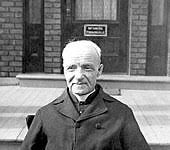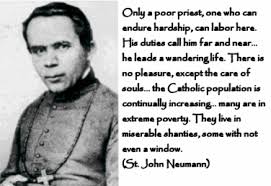As Catholic-Christians, we are called to put into action our faith; a faith rooted in the saving truth through which God has revealed Himself to us in the very Person of Jesus Christ and calls us into an intimate relationship with Him. We experience the Risen Lord’s presence and call in many ways, including through the Holy Mass, through the Scriptures, through our prayer lives, and through creation and other people.1
Our faith is inextricably linked to action for it involves trusting in God and acting in ways that are in accord with His will and that will bring others and ourselves closer to Him. This is implied in the Letter to the Hebrews, which explains that “[b]y faith Abraham obeyed when he was called to set out for a place that he was to receive as an inheritance…” (11:8).
This refers to the Old Testament figure of Abraham being called by God to leave his native country and journey with his wife Sarah, his nephew Lot, and a few other companions to the Promised land of Canaan, where he would become the founder of the Jewish nation of Israel.2 This courageous response to God’s call is known as the obedience of faith or putting one’s faith into action.3
Of all human creatures, the Blessed Virgin Mary most perfectly embodies the obedience of faith. Throughout her earthly life Mary consistently put into action her faith and trust in God, staying with Jesus and suffering alongside Him. She never wavered in her commitment to do His will. 4
Like Mary and Abraham and many other holy men and women who have preceded us, we too are called to practice the obedience of faith.
There are many ways to do this, such as sharing our time and resources with those who are struggling financially and socially, visiting the sick and the lonely, engaging in efforts to improve the environment, and advocating for the right to life from conception to natural death. We are also called to pray for others, including the souls in Purgatory.
The Church explains that persons who die in God’s grace and friendship but still tainted by sin are assured of the fullness of eternal salvation but they need to undergo a purification process before entering the supreme joy of heaven. This purification process is known as Purgatory.5
Purgatory has been described as “one of the most misunderstood doctrines of the Catholic Faith…” despite various Scriptural references to it.6 Beginning with the Old Testament, the Second Book of Maccabees (12:39-46) describes how Judas Maccabeus and members of his Jewish military forces noticed that their fellow soldiers killed in one of their battles had been wearing pagan jewelry that Jews were forbidden to wear. So Judas and his colleagues prayed for their fallen comrades in order that their sins might be blotted out. They also took up a collection and sent it to Jerusalem to provide for a sin offering. The Scriptures state that Judas “made atonement for the dead, so that they might be delivered from their sin” (v. 46).7
In the New Testament we find several references to Purgatory. For instance, in Luke’s account the Evangelist outlines how Jesus, through a parable, describes different outcomes (including beatings for some) for several slaves based on their fidelity, or lack thereof, to their master (12:41-48).
When we read about a master beating his slaves we might find this rather distasteful but we know that having slaves and servants were common in Jesus’ day. Thus, He uses earthly concepts familiar to the people of His time to help them understand more about the kingdom of God.8
Jesus outlines four different outcomes for the various slaves. In the first, the master finds the slave working when he arrives and so the slave is put in charge of all his master’s possessions. In other words, he enters the heavenly banquet for all of eternity. As for the next slave, who beat other slaves and ate and drank too much, he is cut into pieces – meaning he is cast into hell forever. The next two outcomes do not last for eternity but only for a specific period of time; the third slave received a severe beating for knowing what his master wanted done but not doing it, and the fourth a light beating because he did not know what his master wanted done. These final two outcomes refer to Purgatory; a temporary purification process one may go through before entering the eternal heavenly banquet.9
Another New Testament reference to Purgatory is found in Matthew 5, in which Jesus urges His listeners to “[c]ome to terms quickly with your accuser while you are on the way to court with him, or your accuser may hand you over to the judge, and the judge to the guard, and you will be thrown into prison. Truly I tell you, you will never get out until you have paid the last penny” (25-26). For centuries, the Church has interpreted this image of paying off the last penny and then being released from prison as Purgatory.10
And in his remarks about God’s judgment on people following their earthly lives, St. Paul explains that a “…fire will test what sort of work each has done. If what has been built on the foundation survives, the builder will receive a reward. If the work is burned up, the builder will suffer loss; the builder will be saved, but only as through fire” (1 Cor 3:13b-15). This purification process through fire Paul describes is a vivid description of Purgatory.11
When we reflect on Purgatory it is vital that we do so in light of God’s infinite mercy. Purgatory is not about God getting back at us for committing sins but a sign of how much He loves us, and how that love purifies us in the next life so that we can fully experience His goodness and glory for eternity. As the Scriptures say, “… nothing unclean will enter [heaven]” (Rev 21:27) and Purgatory will cleanse us if we need it.
That being said, it is crucial we recognize that we are not called to Purgatory; we are called to go straight to Heaven after we die! For this to occur, we must follow the Risen Lord Jesus with our minds and hearts and truly practice the obedience of faith. This includes praying for the souls in Purgatory, including loved ones who might be undergoing purification before entering Paradise. It is God alone who judges souls and brings them into heaven, but He invites us to participate in this process by praying for the purification of souls who require it. And we know that sincere prayers for the dead during the Holy Mass are particularly fruitful.12
So, let us never cease in our grace-filled efforts to put into our action our faith, to practice the obedience of faith. And let us never stop asking the Blessed Virgin Mary, our mother in faith, for help in doing this. Pray for us, O holy Mother of God, that we may be made worthy of the promises of Christ!
Sources
1 Catechism of the Catholic Church. 142.
2 Source: https://www.britannica.com/biography/Abraham (Retrieved August 1, 2022).
3 Catechism of the Catholic Church. 143.
4 Ibid., 148-149.
5 Ibid., 1030-1031.
6 Source: https://restlesspilgrim.net/blog/2011/05/31/purgatory/ (Retrieved August 1, 2022).
7Source: https://www.catholic.com/magazine/online-edition/is-purgatory-in-the-bible (Retrieved August 1, 2022).
8 Brant Pitre, The Mass Readings Explained. The Nineteenth Sunday in Ordinary Time– Year C (Part one), p. 9.
9 Source: https://www.stpeterinstitute.com/post/luke-12-41-48-proves-purgatory (Retrieved August 2, 2022).
10 Source: https://www.catholic.com/magazine/online-edition/is-purgatory-in-the-bible (Retrieved August 2, 2022).
11 Ibid.
12 Source: https://www.simplycatholic.com/how-to-pray-for-those-in-purgatory/ (Retrieved August 2, 2002).









